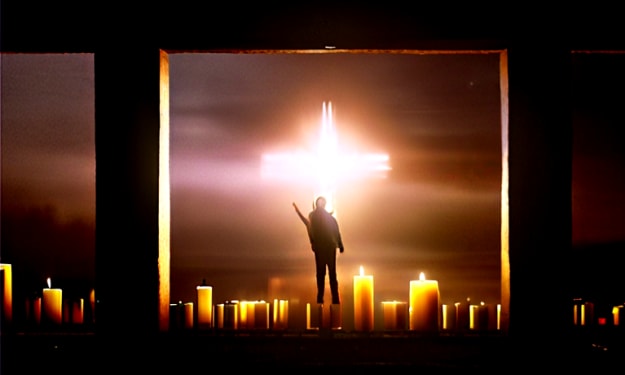20 Years Out, Does 'The Matrix' Still Have You?
How does a quintessential 90s techno gem hold up in 2019?

I don't remember the first time I saw The Matrix, but 10-year-old me was entirely too young to have seen it in theaters in 1999. I didn't get my hands on it until a few years later, in the midst of junior high. I coerced my mom into renting the VHS for me from Blockbuster so many times that we accrued a late fee or two because I kept my hands on it for so long.
Post-Disney adolescent me—swiftly growing out of Goosebumps books and surrealist Nicktoons—knew she'd stumbled onto something mind-blowing. In fact, The Matrix was the first film I'd ever seen that gave me as much to study as the books I was reading. The comedies I'd seen up to that point were fun, but predictable. The horror movies I'd gotten into were bizarrely fascinating, but mostly two-dimensional plots with one-dimensional characters.
The Matrix was something I latched onto immediately. Like most kids, when I found something cool enough, I wanted to be in as close proximity to it as I could. I knew the movie's dialogue back-to-front. Somewhere, there's a photo of teenage me at school in a Trinity costume that rather resembles a stylish vinyl garbage bag. I downloaded the soundtrack and played it nonstop on Winamp (for younger readers: here, educate yourselves)—and despite never having listened to hard/electronic rock music before, it took zero effort to adapt to the Deftones, Rob Zombie, and Rage Against the Machine.
The Matrix often gets corralled into either the sci-fi or the action category, but anyone who's seen it knows it's a little more than either, and much bolder than both. But how does it read in 2019?
For the sake of time, here's a list of the highlights:
You've got to remember, this was 1999. We hadn't yet been inundated with modern superhero film effects, and George Lucas was still working on the over-saturated (though still entertaining) mess that is the 2nd Star Wars trilogy.
Having the film open with a 360-degree a view of Carrie-Anne Moss crane-jumping into the air, then running across walls and leaping between skyscrapers? That was brand spankin' new.
You'd think that some the simpler effects—like the silvery mirror goo— might play as lame now, but they come off pretty well. They never needed to be outrageous to capture the audience's imaginations. Most of the machines featured still do the trick; the real world sentinels ("Squiddies") are hard as nails, terrifyingly quick, and menacing.
I only spotted two areas where the effects aged horribly, and they both involve hokey-looking light. Near the end, before Agent Smith corners Neo in the train station, Neo ushers Morpheus to the ringing pay phone to exit the Matrix. Upon answering, he's consumed by a gaggle of tubey glowing lights that look like a Windows Media Player's visualization. The other misfire is when Neo defeats Agent Smith at the end by inhabiting his person and making him implode with light. It has "90s TV SFX" written all over it.
The good thing about The Matrix is that even though the matte black sliding phones are dated as hell, and the beige box that sits on Mr. Anderson's office desk is painfully huge, the rest of the movie is full of characters who clearly know way more about how to wield technology for the greater good… so it's a bit of a wash.
It's also not like this movie is trying to pretend it's set in any other time period. Morpheus acknowledges that it's set in 1999 (though actually "closer to 2199"). The soundtrack is entirely appropriate for turn-of-the-millennium trends; the electronic tracks (Lunatic Calm, Propellerheads) are the last remnants of club/rave culture after the dot-com era, and the rock tracks (Marilyn Manson, Rammstein) are every bit the brutality that comes along with discovering you've been inhabiting a world that isn't real. Speaking of which...
Characters in a lot of older movies talk about future technology as if they expected fundamental leaps and bounds by 2019—like we were supposed to have had flying cars and teleportation by now. The Matrix illustrates a pretty drastic leap that isn't nearly as exciting... Morpheus explains that the advent of artificial intelligence in the early 21st century backfired horrifically, resulting in "a singular consciousness that spawned an entire race of machines." While humans were celebrating the peak of their ingenuity, they were losing a war they didn't even know they'd started.
We are not there yet, but the details around this narrative aren't terribly outrageous to consider. The scene where Neo truly wakes up for the first time in his pod, effectively having been a battery his entire life, is still shocking—not to mention the fields of humans being grown as AI energy sources. It's an extreme reflection of the way we (and our data and our connectivity) feed applications and technologies that are evolving by the minute, thanks to our participation.
Religious/philosophical themes are foolproof, if used correctly.

"This is your last chance. After this, there is no turning back. You take the blue pill—the story ends, you wake up in your bed and believe whatever you want to believe. You take the red pill—you stay in Wonderland, and I show you how deep the rabbit hole goes."
This is the part of The Matrix that essays are based on. (In fact, my high school creative writing teacher offered me a writing prompt for a paper comparing the themes of this movie with Orwell's 1984. It made me a happy little geek.) There are a couple of big ideas here, and though the Wachowskis were a little heavy-handed at including them, they fit together flawlessly in this story.
- The Buddhist idea of enlightenment. If you're waking up for the first time in the real world and understanding that you've been living in a simulation in your mind for years, that's certainly one level of enlightenment. If you're Neo, fated as The One who'll bring about the destruction of that simulation, you've got an extra workload: He then has to understand what this false system is, how it works, how it can be manipulated, what the nature of his existence was while he was inside of it, and what his affect on it can be now that he's out of it and able to see it for what it truly is. As Cypher would say: "Jee-SUS, what a mindjob!" (For further reading: "Buddhism and 'The Matrix'".)
- Neo as a savior figure. This one's pretty obvious: The people of Zion, the last human city, have been hiding from the machines for years now. Morpheus and his group have been searching for the person who's been fated to destroy the Matrix, thereby not only showing humankind "the light" of the truth, but freeing everyone to live in peace.
"Jiu-jitsu? I'm going to learn... jiu-jitsu?"

"Hit me... if you can."
The best damn thing about this film is the stunt work. The fact that the actors did a ton of that work themselves makes all the difference. Whatever you think of Keanu Reeves' acting abilities, you certainly can't accuse him of not committing to his role.
It's also worth noting that martial arts (and other Asian stylistic influences from manga/comics) hadn't made their way into mainstream American movie culture quite yet. So many of the action sequences here are framed and shot as if they're doubling as comic book panels in motion. The fight scenes were masterfully choreographed by Yuen Woo-Ping, whose work you'll also recognize in Crouching Tiger, Hidden Dragon and both halves of Kill Bill.

I was happiest to realize that in 2019, The Matrix still feels exciting. There are so many things that stand out about it as not just trendy bits of 90s zeitgeist, but as genuinely excellent pieces of film-making. The first third of it is so careful with how it reveals information to us (and to Neo) that it's hard not to be drawn in if you haven't seen the film in a while. Hugo Weaving continues to be one of my favorite screen villains. You can tell he feasted on this role.
The cinematography and the direction are a well-oiled pair. This could have easily played as a much more hokey sci-fi flick, but the visuals are what elevates this movie to iconic status. I haven't seen Reloadedand Revolutionsin over a decade, and even though I loved them after they were released, I can't imagine liking them much now. They are, as most film sequels are doomed to be, overkill and eye candy.
What The Matrix does so well is to lay a spread that's just rich enough to be satisfying on its own. The big question at the end was how the hell Neo would attempt to free the human race from a simulation policed by an all-knowing, ever-present sentient villain... but we didn't necessarily need to see that. It was enough to trust what we were shown in that last scene, narrated by a Neo who looks and sounds very much like he's finally discerned the difference between knowing the path and walking the path.
About the Creator
Nikki Davis
Pop culture + entertainment nerd. Former film student, live music addict, and lover of all things art & design. I like picking apart media. :)






Comments
There are no comments for this story
Be the first to respond and start the conversation.